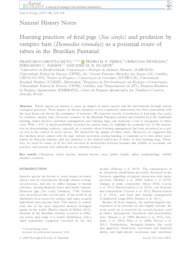Hunting practices of feral pigs (Sus scrofa) and predation by vampire bats (Desmodus rotundus) as a potential route of rabies in the Brazilian Pantanal.
Hunting practices of feral pigs (Sus scrofa) and predation by vampire bats (Desmodus rotundus) as a potential route of rabies in the Brazilian Pantanal.
Author(s): GROTTA NETO, F.; PERES, P. H. F.; PIOVEZAN, U.; PASSOS, F. C.; DUARTE, J. M. B.
Summary: Exotic species are known to cause an impact on native species and the environment through various ecological processes. Their impact on disease dynamics is not completely understood, but their relationship with the local fauna can favour the emergence of zoonoses. We reported records of predation of feral pigs (Sus scrofa) by common vampire bats (Desmodus rotundus) in the Brazilian Pantanal wetland and detailed how the traditional hunting, which involves castration management and hunting dogs, can represent a risk to emergency of rabies virus. With 1.43% of attack probability recorded by camera traps, we highlight the potential role of this interaction in disseminating zoonosis, especially in a scenario where hunting management has been prioritised as a policy tool in the control of exotic species. We alerted for the danger of rabies onset. Moreover, we suggested that the ranchers avoid contact with the pigs’ salivary secretions during hunting, to maintain up to date rabies vaccination on domestic animals, and pay attention to the clinical behaviours of rabies in their hunting dogs. Therefore, we must be aware of all the risks involved in interactions between humans and wildlife to reevaluate our practices and prevent viral outbreaks as we currently witness.
Publication year: 2021
Types of publication: Journal article
Observation
Some of Embrapa's publications are published as ePub files. To read them, use or download one of the following free software options to your computer or mobile device. Android: Google Play Books; IOS: iBooks; Windows and Linux: Calibre.
Access other publications
Access the Agricultural Research Database (BDPA) to consult Embrapa's full library collection and records.
Visit Embrapa Bookstore to purchase books and other publications sold by Embrapa.

